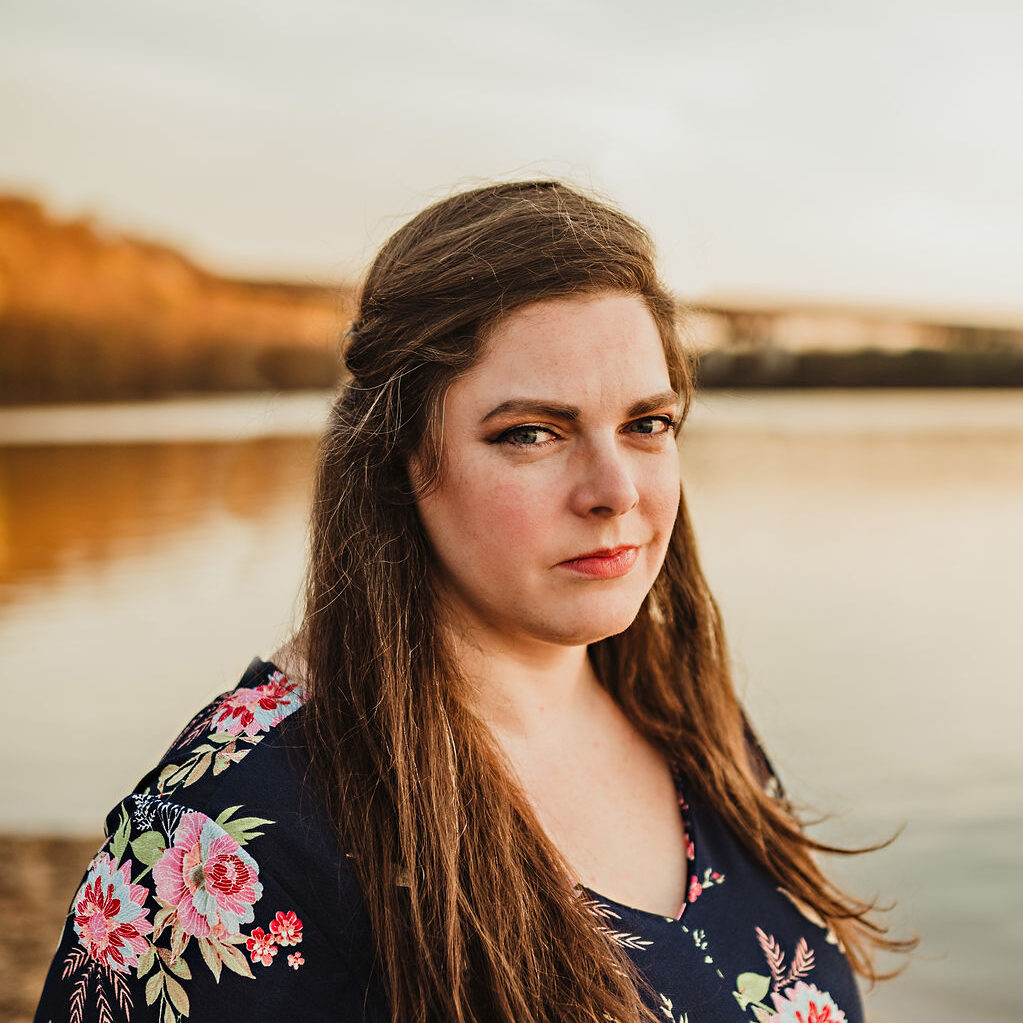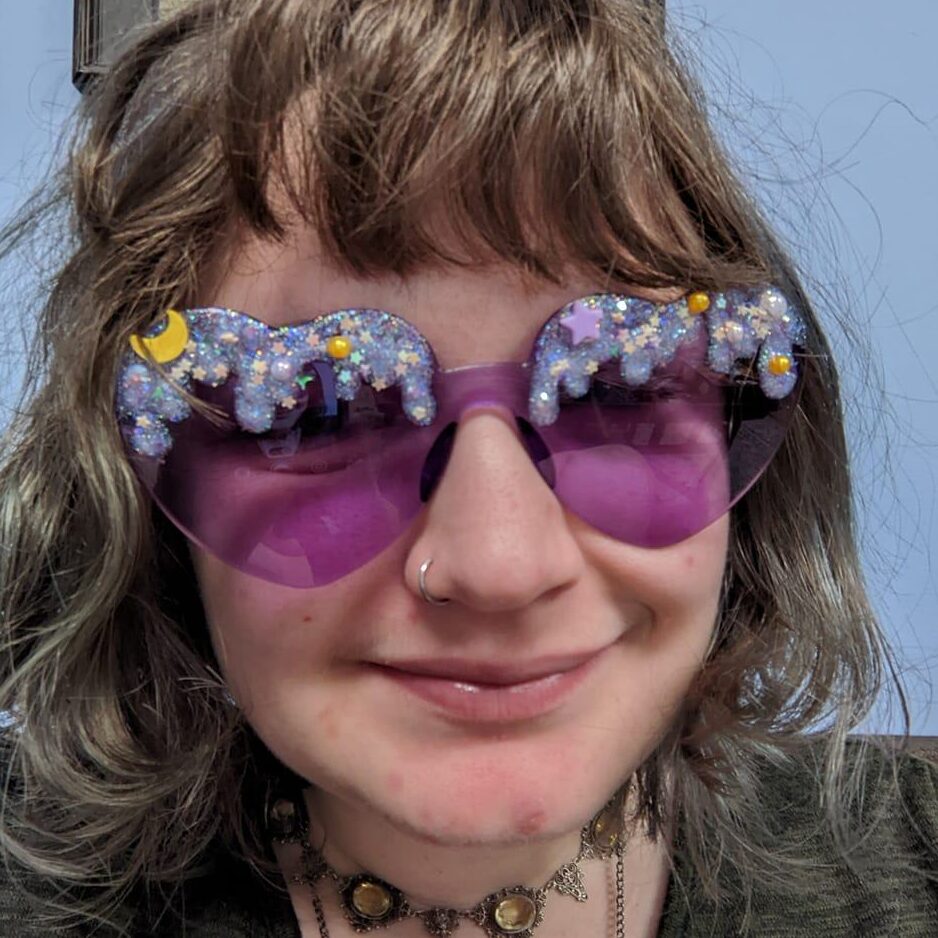The poetry collection, Yoke, navigates the emotional aftermath two untimely deaths — the accidental death of a college friend, Wade Steffey, and the enigmatic suicide of the author’s brother’s best friend. These poignant events are the fulcrum around which the collection revolves, providing a raw and powerful look at grief and the quest for meaning in the face of inexplicable loss.
Through carefully crafted couplets, Quatmann invites readers into their journey of sorrow and recovery, offering insights that resonate with anyone who has wrestled with their own bereavements. Yoke aspires not only to be a mirror reflecting personal anguish, but also a beacon for those who are navigating their paths through the darkness of loss.
Caiti Quatmann (she/her) is a disabled poet and Editor-in-Chief for HNDL Mag. We spoke with her about how she started writing, her favorite poems in the collection, and what she’s working on now.
This interview has been edited and condensed for clarity.
First off, what got you into poetry? When you started writing, were the themes of death, grief, and trauma important to you, or did you come to them later?
I started writing poetry at a young age. I think I have a poem in a notebook somewhere from sixth grade. But the themes of death, grief, and trauma became central later in my life, particularly after the deaths of two close friends when I was around twenty. That’s when I first began writing poems about them, but looking back, those early attempts were more like diary entries — important for me to write as an individual, but not something that would have resonated with a wider audience. The hard part about writing about such heavy, personal subjects is that it takes time, and a lot more time than I initially realized.
For Yoke, it took at least fifteen more years before I had enough distance to process those events and feelings into something that was not only cathartic for me, but also enjoyable and meaningful for a reader. For a long time, the poems were simply not good — they were raw and unrefined, and I needed that space and time to turn them into something more polished, something that could invite a reader into the experience without overwhelming them.
Your poetry is also a memoir. How do you navigate opening yourself up through poetry? Does it come naturally?
My initial forays into poetry were largely about processing emotions, especially as a teenager. I’d fill notebooks with poems, thinking I was opening myself up and being vulnerable. But when I look back at that early work now, I realize it was actually quite closed off. I was approaching difficult emotions indirectly, using overwrought metaphors or withholding too many details. As much as I thought I was expressing something deep, those early pieces were more about protecting myself than about truly opening up. As a result, they didn’t connect with readers — they were too locked up in my own experience to invite others in.
It wasn’t until years later, when I started seriously considering a professional career in writing, that I reconnected with Jason Sommer, my undergraduate thesis advisor. Jason is an esteemed Holocaust poet, and meeting with him again after all those years made a huge impact on my writing. He told me I needed to be more explicit in my poetry, to reveal more, to trust that vulnerability would allow readers to care and connect. He emphasized that without truth and openness, the work would remain closed off and isolated, much like those early poems. It was advice I hadn’t fully been ready to hear when I was younger, but now it resonated deeply.
The shift toward vulnerability didn’t come naturally. In fact, it took me years of trauma work — through therapy, somatic practices, and personal reflection — before I felt I could open up honestly in my writing. I’d spent at least twelve years on and off doing the work to get to a place where I could speak about trauma directly, rather than hiding behind layers of metaphor. I needed to reach a point where I was in a good enough place with my own experiences to write about them in a way that was truthful but also accessible to others.
Without that level of vulnerability, the poems wouldn’t have connected with readers — they would’ve stayed as personal reflections, perhaps meaningful to me but not engaging for anyone else. Writing with that openness has been essential for me, and I think it’s what allows the poems in Yoke to resonate beyond my individual story.
Are there poems from your collection that are favorites? Why?
It’s so hard to choose a favorite because every poem in Yoke holds significance for me. One that seems to resonate most with readers is “The Wild.” I think that’s because nature poetry has this ability to feel both universal and deeply personal. It can be beautiful, haunting, and contain truths that feel timeless. It also stands out because it’s a bit lighter in tone compared to many of the other poems in the collection — it doesn’t require the same contextual understanding, making it more accessible on its own. It’s one of the few poems that can exist without the weight of the rest of the book to give it meaning.
However, my personal favorite is ”If We Could Rewind.” That poem was heavily influenced by Matt Rasmussen’s “Reverse Suicide” from his award-winning collection Black Aperture. I first read Rasmussen’s book in graduate school, and it became the biggest influence on Yoke as a whole. His collection processes his brother’s suicide, and I was struck by how he could write about such a heavy subject for an entire book and still keep each poem fresh, interesting, and heartbreaking. In “Reverse Suicide,” he imagines his brother’s suicide in reverse, and attempts to poetically rewrite the suicide and thus make alive his brother.
“If We Could Rewind” was my attempt to capture that same kind of reversal—to imagine tragedy being undone, time moving backward to prevent the loss. It was also the first poem in Yoke that I wrote and kept almost entirely in its original form. I wrote it sometime during graduate school. While I’d written poems about Mike and Wade before, none of them were very good (and none of those made it into the book). This one felt right from the start, and I think it captured something I had been trying to express for years.
What are your writing plans for the future?
I have lots of plans for my writing moving forward. Currently, I’m querying publishers for my next poetry chapbook, Meditation (On Cheese), and I’ve recently finished my first full-length collection, M(other)hood. I’ll be focusing on finding the right publisher for M(other)hood starting next year.
In addition to these projects, I’m continuing my work with HNDL Mag, where we’re hoping to expand into print editions. We’re working through the logistics, and in the long term, I’m also hoping to see HNDL grow into a platform that publishes anthologies and chapbooks, though there are still many legal and logistical details to figure out.
Beyond poetry, I’ve been venturing into fiction writing and am currently working on my first novel, which is a multi-generational story about mothers and daughters. I’ve also been exploring flash fiction and continue to send my poetry to literary journals.
On top of that, I’ve started doing developmental and line editing for poetry manuscripts, which I’ve found really rewarding. Eventually, I’d love to organize writing workshops, retreats, or even local poetry readings to help build and support the literary community. I’ve got a lot of exciting projects in the works, and I’m always looking for new ways to grow as a writer and help others do the same.
Do you have advice you can share about writing about loss and grief? Are there things you wish you could have said to the past you?
One of the most important pieces of advice I can give is to allow yourself to be vulnerable. When writing about loss and grief, it can be tempting to conceal certain emotions or details, but it’s through that openness that your reader will truly connect. Remember, as writers, it’s essential to process our emotions, but our end goal is also to move and transform our readers. That means the writing needs to go beyond what should remain in our diary. Vulnerability creates that bridge—if you’re not honest or if you’re holding back, the reader won’t feel invested in the work.
Another key point is that writing about this kind of subject matter takes time. It took me more than a decade and a half to reach a point where I could write about my own experiences in a way that was honest, vulnerable, and ready to share with the world. Don’t rush the process. Everyone’s timeline is different, and it’s okay if it takes longer than you expect. Allow yourself the space to process and heal in your own time, because the writing will only benefit from that. Rushing it might lead to work that feels too raw or unfinished to resonate with readers in the way you hope.
Anything else you would like to add?
I’d just like to say that I hope Yoke offers a space for readers to sit with their own grief and experiences. Poetry can be such a powerful tool for connection, and if any part of this collection resonates with someone who’s going through something similar, that’s more than I could ever ask for. Writing Yoke was as much about finding healing for myself as it was about offering something to others, and I hope readers feel that when they engage with the work.


